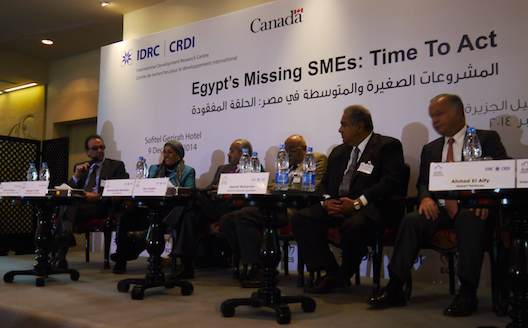Egypt startups need a big business leg up


During an International Development Research Centre (IDRC) roundtable on Tuesday, co-hosted by the Egyptian Centre for Economic Studies, the role large corporations should play in helping SMEs was one of the topics under discussion, and that had considerable support among business people.
IDRC researcher Iris Boutros told Wamda the main problems she’s found during IDRC’s initial research on SMEs were around networking, difficulties in accessing markets, a lack of business knowledge and a dearth of leaders to champion the cause of SMEs and startups. She hoped the roundtable would be the start of a "conversation" around SME assistance.
Possible solutions, however, were in short supply. They included enforcing the law requiring the government to allocate a percentage of state contracts to small and medium enterprises (SMEs), and widening the idea of corporate social responsibility to include entrepreneur mentoring and business advice, instead of just “planting trees”.
Flat6Labs founder Ahmed Alfi said the other key issue was for large businesses to make it easier for SMEs to deal with them. “There should be a lot of peer pressure and guilt put on (large businesses),” he said. “What big companies have failed at here is dealing with small business.” This meant making is easier for startups to take up subcontracts or provide services.
Boutros told Wamda of an entrepreneur she informally mentors who faced just that problem. Yasser el-Zahhar launched a corporate catering business this year, but in the early stages he was repeatedly knocked back by large businesses. The message was that el-Zahhar needed to be in business for a certain number of years before they would take a chance on him.
Currently in Egypt some businesses, just as Souq.com and IBM, run innovation programmes designed to promote entrepreneurialism or give startups a hand up, but these are largely limited to multinational technology companies. Some smaller tech companies, such as Alexandria-based SoftExpert Software, run in-house entrepreneur competitions.
Internationally, American company VentureScout opened a branch in Egypt this year with Startup MENA. It finds startups for corporations looking to partner rather than compete with entrepreneurs working at the cutting edge of technology.
But what Boutros would like to see is greater partnership on a business-level. This means selling corporations on working with SMEs and advertising the benefits of mentoring and business partnerships.
These options may include encouraging outsourcing of sideline business, such as lunchtime catering; creating better ways to use business mentors’ time to help a larger number of people, such as a monthly Google Hangout meeting; or educating banks on how they can work with startups rather than ignoring them.
It was also important to stop blaming the government for every problem in the startup ecosystem and begin looking at alternate solutions.
Roundtable panelist Shantayanan Devarajan, the World Bank’s MENA chief economist, said this was a chance for large businesses to make some money.
Services such as factoring, are processes large corporations can do in-house thanks to their economies of scale, but hard to find for SMEs without that capacity. Devarajan said this was one service big businesses could provide for a fee to their smaller cousins.


